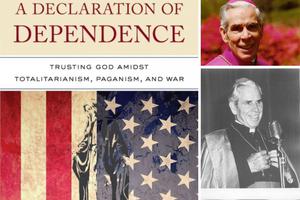How Catholics Can — and Should — Engage Modernity
Trio of books has relevance in our postmodern society.

Survey of the Enlightenment Offers Lessons for Today
RETHINKING THE ENLIGHTENMENT:
FAITH IN THE AGE OF REASON
By Joseph T. Stuart
Sophia Institute Press, 2020
387 pages, $19.95
To order: ewtnrc.com or (800) 854-6316
The Enlightenment has traditionally been a Catholic whipping boy. Joseph Stuart, chairman of history at the University of Mary, deems that caricature too simplistic.
“The Enlightenment did not simply oppose reason to faith. Anti-Christian rationalism fueling the French Revolution was not the whole story. … Since the Enlightenment was a cultural movement and not just a set of ideas labeled ‘anti-Christian,’ a wide population — not simply elite thinkers — participated in it.”
The author argues that recent research lets us identify at least three approaches to the very broad phenomenon called the Enlightenment, which elicited three different Christian responses: the “conflictual,” the “engaging” and the “retreat.”
“There is a need for all three strategies. Conflict without engagement is senseless. Engagement without conflict is weak. Either strategy without retreat lacks wisdom. Retreat without conflict or engagement is stultifying.”
Stuart divides his book into these three strategies. In the “conflictual” strategy, he details the ideas of Rousseau and Voltaire, how they led to the French Revolution, and how they elicited Catholic opposition, epitomized in the martyrdom of the Compiègne Carmelites. He also discusses how Catholics fed into that polarized era by the absolutist Louis XIV’s revocation of religious toleration in France.
In the “engaged” strategy, Stuart focuses on how Italian Catholics (he highlights Maria Agnesi, Pope Benedict XIV and Anna Morandi) bridged faith and reason in more friendly ways, participating in scientific advances (especially in anatomy) as compatible with religion. In the “retreat” strategy, Stuart examines how the “Practical Enlightenment” of England and its colonies, leading to technological achievements bettering everyday life, interfaced with how “households” critically screened, through the prism of faith, the broader cultural ideas entering them. He holds forth the home of John and Charles Wesley, founders of Methodism, as an example where the importance of religion was inculcated at home while aware of and being critically engaged with the outside world. That “engage-and-retreat” strategy gave the Wesley brothers the religious principles they needed to bring revivalist religion successfully to their world in its mental categories, reestablishing the relevance of religion for the new industrial masses. He also argues that this mixed and moderate strategy staved off the polarization that fired the French Revolution:
“[There was a] divorce between head and heart … across the English Channel. Still impassioned by Descartes, French elites operated under the assumption that all problems, even political ones, could be solved by the spirit of mathematical clarity and simplicity. But their hot heads made for cold hearts. The ‘nakedness and solitude of metaphysical abstraction’ separated universal principles (such as ‘liberty,’ ‘equality,’ and ‘fraternity’) from wisdom and real life, [Edmund] Burke charged. This led to a ‘savage atrocity of mind.’”
I liked this book. I disagree with it in many ways (he’s too optimistic), but I recommend it. Its thesis is novel, the range of its data and arguments both broad and deep, and its claims thought-provoking. Stuart writes engagingly and his style flows, as the British would say, “swimmingly” (and not, as with some authors, in “salmon” style, i.e., a constant upstream slog).
Rethinking is a history but has great contemporary relevance. Contemporary neo-paganism masquerading as “enlightenment,” poses questions of how modern Catholics should engage with today’s “savage atrocity of mind.” Fight wokeness? Go with the flow? Retreat into “intentional communities”?
Stuart’s survey of the past offers lessons for today. Another broader question under the surface of this book is the compatibility of the American experiment with Catholicism: Have we only recently lost our bearings (Robert Reilly) or is the poison pill in the well itself (Patrick Deneen)? Worth the read.
Reclaiming Judeo-Christian Witness
BEHEADING HYDRA
A RADICAL PLAN FOR CHRISTIANS IN AN ATHEISTIC AGE
Father Dwight Longenecker
Sophia Institute Press, 2021
221 pages, $18.95
To order: ewtnrc.com or (800) 854-6316
The hydra, in Greek mythology, was a venomous monster whose breath was deadly. If someone cut off one of its heads, two would replace it.
Father Dwight Longenecker uses the hydra as a symbol of the lethal mindsets poisoning the modern mind. He identifies 16: materialism, atheism, scientism, historicism, utilitarianism, pragmatism, progressivism, utopianism, relativism, indifferentism, individualism, tribalism, sentimentalism, romanticism, eroticism and Freudianism. Because they mutually reinforce each other, real debate is impossible. Modern “dialogue” usually degenerates quickly into non-sequiturs, ad hominem attacks, emotional appeals or “You have your truth and I have mine.” If you focus on one objection, another — like a hydra’s head — will quickly rear itself.
“The belief system of modern man is difficult to define because it is not specified or systematic. It is a worldview without a label and a religion without a creed. Instead, it is a compendium of lies, a catalogue of deceptions, a septic tank of subterfuge. The lies are never explicit to our society. They lurk beneath the surface as a set of assumptions. These lies are not an aspect of the culture. They are the culture” (emphasis original).
The author then explains each one in a punchy, no-nonsense way. He notes how they all eventually feed off atheism: Whether someone outright denies God or simply thinks the material world is all there is, he’s likely to default to scientism (since that’s all he can measure or test), utilitarianism (we need a pragmatic solution right now), sentimentalism (don’t you care about real people?), and eroticism (sex has been offering greater “happiness” for the greatest number throughout history).
Father Longenecker just doesn’t catalog the problems, he offers a solution.
He begins, however, by insisting we avoid two dead ends: confrontation and accommodation. Confrontation is ineffective, he claims, because we no longer talk the same language. Creedless religion has so changed the terms (and shifts the arguments when you zero in on them) that we just talk past each other. Accommodation just accelerates the slouch towards Gomorrah.
He proposes the “radical” solution of “creative subversion.” If enough of us just simply starting living our faith seriously, thoroughly and deeply, the counterculture witness would be powerful and attractive. That starts with a real, personal relationship with Jesus — not just thinking about Jesus.
“The Christian faith is about a firsthand, heartfelt, life-changing, soul-wrenching, eye-opening, lip-trembling, spine-chilling, face-to-face encounter with the Lord Jesus Christ, King of the Universe, Son of God and Son of Mary, the Lamb of God who takes away the sins of the world. It is about falling down at the foot of the Cross where He laid down His life and knowing that the blood from His side has washed away your sin and turned your life around and you will never be the same again.”
That sounds evangelical, which Father Longenecker was before Jesus eventually led him to the Church. And he’s emphatic that the sacraments are “one of the ways to encounter Christ — to repent of our sins, accept Jesus, and be born again.” But, to borrow from St. John Henry Newman, Christianity has to be real encounter, not just a notional idea.
A provocative book diagnosing the ailments of our day and especially of wokeism, this book highlights the need to reclaim Judeo-Christian witness.
My criticisms are two. His treatments of “substance” (vis-à-vis the Eucharist) and of “knowledge of good and evil” seem a bit simplistic. His “radical” witness of taking Catholicism seriously is a first step but, like Rod Dreher’s “Benedict Option,” seems to abandon the culture. Take it from a kid who grew up in industrial New Jersey: Your options to live healthy are going to be limited if the air you breathe is polluted. The same applies to cultural air.
Appealing to Conscience: Timely Topics to Consider
DISPUTES IN BIOETHICS:
ABORTION, EUTHANASIA, AND OTHER CONTROVERSIES
Christopher Kaczor
University of Notre Dame Press, 2020
220 pages, $30
To order: undpress.nd.edu or (800) 848-6224, ext. 1
Given that much of contemporary bioethics seems dedicated to justifying what people want to do anyway, from combining human sperm and eggs with animals’ to experimenting on embryos to rationalizing physicians murdering patients, when a book treats bioethical questions in a manner consistent with the Catholic sanctity-of-life ethic, it deserves readership. Christopher Kaczor’s is such a book.
Because bioethics technically falls under philosophy, not theology, Kaczor writes that he comes at these questions “from a methodology that maintains the inherent dignity of all human beings who … merit protection in their basic goods.” The Catholic sanctity-of-life tradition, as articulated in its medical ethics, always understood itself as grounded in natural-law moral principles binding all persons, irrespective of religion. It’s only secular bioethics that wants to turn the Catholic sanctity-of-life ethic into some quaint sectarian outlier.
Kaczor, professor of philosophy at Loyola Marymount Los Angeles, deals with 17 questions that can be grouped into three major categories: the beginning and end of life and conscience rights. While each chapter can be read as a self-contained essay, they cohere effectively as a book.
The questions Kaczor tackles are at the forefront of contemporary bioethics, which shows the reader just how far that “mainstream” has veered from a sanctity-of-life ethic.
In “Is There a Right to the Death of the Fetus?” Kaczor examines the underlying debate behind resistance to “born-alive” protective legislation: Does the “woman’s right” to abortion extend to removal of the unborn child from her body or to its death? In “Should We Make Children with Three (or More) Parents?” Kaczor explores not just the slicing and dicing of parenthood into genetic, gestational and social shards, but the technological possibilities of designer babies brought to you by today’s biology and genetics. In “Should Euthanasia Be Permitted for Children?” he explores the implications of notions of “children’s rights” and “autonomy” that have already answered that question affirmatively in Belgium and which underlie what has brought America the availability of abortion for minor children, without parental consent and sometimes even their knowledge, and which is agitating for similar erosion of parental rights vis-à-vis “gender transitioning.”
Readers might be particularly interested in Kaczor’s robust defense of conscience rights, an area where state power is likely to continue to drill down on faithful Catholics — especially in the health professions — who refuse to participate in abortion or sexual-identity “rights.” Given exaggerated notions of patient “autonomy,” secular bioethics treats doctors less as professionals with their own consciences as much as service providers effectuating patient’s wishes. It is imperative that Catholics — who gave birth to hospitals — not be driven from the healing professions.
Consider Kaczor’s example involving a more politically correct victim: A 50-year-old female Muslim OB-GYN works in an urban area, has an effective outreach to otherwise underserved minority populations, but is pro-life and forced out of the profession. She is also the sole support of her own three children. Who benefits?
Losing her job “directly and gravely harms [her] and her children. It harms the local Muslim community, who is deprived of a physician with a wonderful rapport with the recent immigrants. [It] does not even benefit women seeking abortions, since they have dozens of abortion providers in the area and they lose the services of [a physician] who is now no longer available to provide gynecological exams, or pap smears or anything else.”
But a pledge of allegiance to “abortion rights” has been made.
- Keywords:
- john m. grondelski
- book picks
- secular ideology
- abortion
- euthanasia
- bioethics
- christian witness
- enlightenment

















